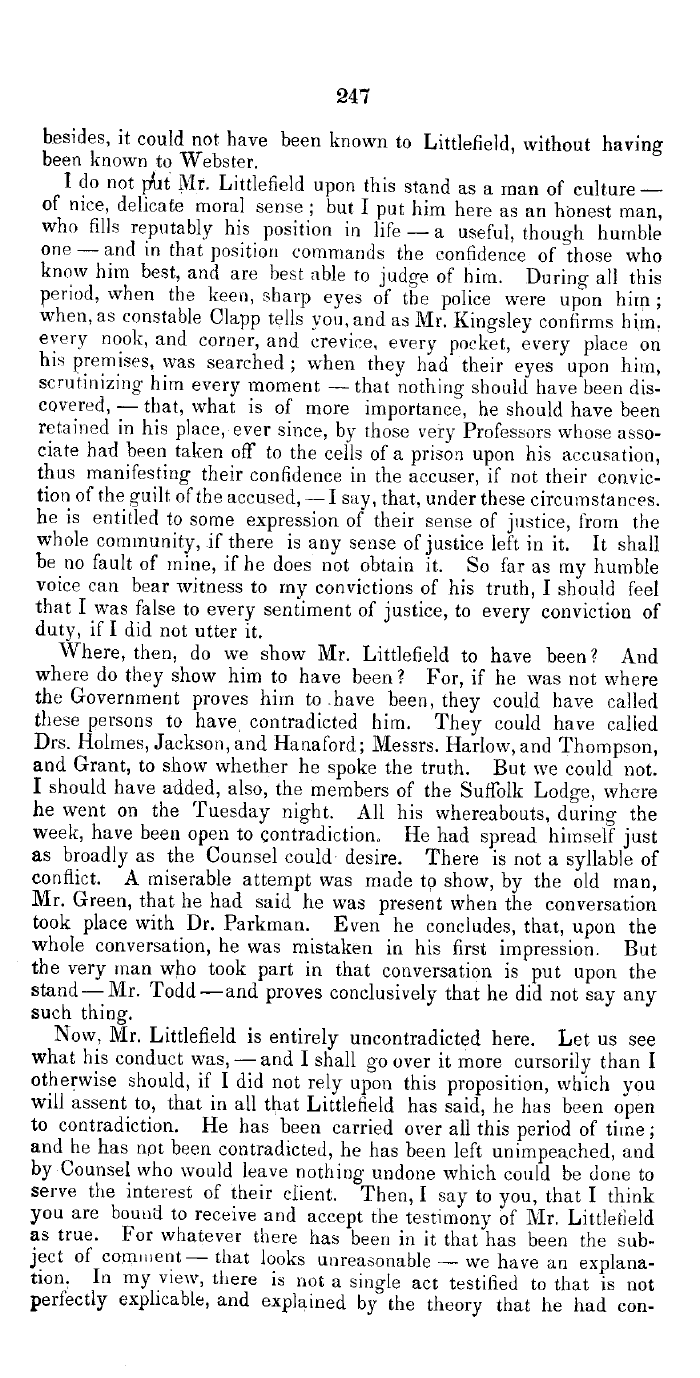|
247
besides, it could not have been known to Littlefield, without having
been known to Webster.
I do not pert Mr. Littlefield upon this stand as a man of culture
of nice delicate moral sense ; but I put him here as an honest man,
who fills reputably his position in life - a useful, though humble
one - and in that position commands the confidence of those who
know him best, and are best able to judge of him. During all this
period, when the keen, sharp eyes of the police were upon him ;
when, as constable Clapp tells you, and as Mr. Kingsley confirms him,
every nook, and corner, and crevice, every pocket, every place on
his premises was searched ; when they had their eyes upon him,
scrutinizing him every moment -that nothing should have been dis-
covered - that, what is of more importance, he should have been
retained in his place, ever since, by those very Professors whose asso-
ciate had been taken off to the cells of a prison upon his accusation,
thus manifesting their confidence in the accuser, if not their convic-
tion of the guilt of the accused,-I say, that, under these circumstances.
he is entitled to some expression of their sense of justice, from the
whole community,.if there is any sense of justice left in it. It shall
be no fault of mine, if be does not obtain it. So far as my humble
voice can bear witness to my convictions of his truth, I should feel
that I was false to every sentiment of justice, to every conviction of
duty, if I did not utter it.
Where, then, do we show Mr. Littlefield to have been? And
where do they show him to have been? For, if he was not where
the Government proves him to .have been, they could have called
these persons to have contradicted him. They could have called
Drs. Holmes, Jackson, and Hanaford; Messrs. Harlow, and Thompson,
and Grant, to show whether he spoke the truth. But we could not.
I should have added, also, the members of the Suffolk Lodge, where
he went on the Tuesday night. All his whereabouts, during the
week, have been open to contradiction. He had spread himself just
as broadly as the Counsel could desire. There is not a syllable of
conflict. A miserable attempt was made to show, by the old man,
Mr. Green, that he had said he was present when the conversation
took place with Dr. Parkman. Even he concludes, that, upon the
whole conversation, he was mistaken in his first impression. But
the very man who took part in that conversation is put upon the
stand-Mr. Todd-and proves conclusively that he did not say any
such thing.
Now, Mr. Littlefield is entirely uncontradicted here. Let. us see
what his conduct was,-and I shall go over it more cursorily than I
otherwise should, if I did not rely upon this proposition, which you
will assent to, that in all that Littlefield has said, he has been open
to contradiction. He has been carried over all this period of time ;
and he has not been contradicted, he has been left unimpeached, and
by Counsel who would leave nothing undone which could be done to
serve the interest of their client. Then, I say to you, that I think
you are bound to receive arid accept the testimony of Mr. Littlefield
as true. For whatever there has been in it that has been the sub-
ject of comment- that looks unreasonable - we have an explana-
tion. In my view, there is not a single act testified to that is not
perfectly explicable, and explained by the theory that he had con-
|

